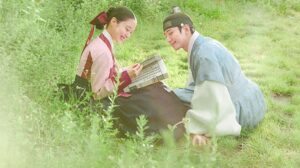
As MBC‘s first sageuk in 14 years, there were a lot of expectations riding on The Red Sleeve, which its first half meets with flourish. Promoted as a “traditional sageuk”, The Red Sleeve stands out amidst the sea of currently airing sageuks for its adherence to historical context, its tight storytelling and its subversion of typical sageuk norms. Thankfully, the general public seems to think the same, and its ratings have been rising steadily with each week.
Based on Kang Mi-kang‘s novel of the same name, the drama depicts the story of Crown Prince Yi San (later King Jeongjo) and his personal court lady, Sung Deok-im (later Sung Uibin), played by 2PM‘s Junho and Lee Se-young respectively. While their romance is a significant part of the drama, and this couple definitely has sizzling chemistry, The Red Sleeve takes great efforts to develop all of its characters individually, giving them personalities and complexities that make them feel like real people.
This review contains spoilers.
For starters, it makes full use of its historical context. San is the son of the infamous and allegedly mentally ill Crown Prince Sado. Prince Sado raped and murdered many palace staff, and was also abusive to his wife and concubines. This culminated in him being executed by his father, King Yeongjo. Sado was sentenced to death by confinement in a rice chest. This dark historical legacy plagues San’s present, whether it’s in him being labelled as “the son of a criminal” and thus undeserving of being Joseon’s next king, or in his complicated relationship with his grandfather. The Red Sleeve tackles these issues with sensitivity, highlighting just how impactful Sado’s legacy was on a personal and court-wide level.
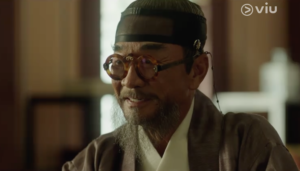
An example of this is a standout scene in Episode 5, when San is confined to his palace by his grandfather for visiting courtesan houses. In his anger, Yeongjo (played by the scene-stealing Lee Deok-hwa) goes over to the East Palace and slaps San repeatedly, telling him over and over that he can be different from his father. This powerful and heartwrenching scene conveys at once how abusive this relationship has been, and how the weight of Sado’s death hangs so heavily on this royal family. There is love in this relationship, but there is also fear and resentment in the mix, and the two actors express this in each electrifying interaction they have. Yeongjo himself is a bag of contradictions – on one hand, he wears adorable reading glasses as any kindly grandfather would, but on the other hand, his erratic mood swings make him a wildly dangerous figure. Lee Deok-hwa pulls off this character superbly, and his version of Yeongjo is definitely one for the books.
Sado’s legacy also plays into the opposition that some court ladies have towards San taking the throne. In particular, Head Court Lady Jo (Park Ji-young) is the brutal leader of a secret faction of court ladies working against the Crown Prince. While her desire to overthrow San might have started from personal jealousy, her fear of Sado’s son taking the throne is extremely valid, considering the way Sado terrorised the court ladies back in his day. As someone who has sworn to protect the court ladies under her watch, San is indeed the greatest threat on the horizon, especially if he ends up developing the same mental conditions that his father did. She is one of the few clear villains in the show, but her backstory is well developed and her motivations are sound, enough for viewers to understand why she is acting in the way that she does.
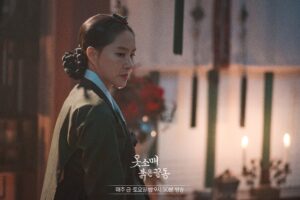
Head Court Lady Jo also has an instrumental part to play in shaping Deok-im’s story. It was on her command that Deok-im made the fateful visit to Consort Yeong’s palace and ran into San as a child, and it was also her interference that enabled Deok-im to work in the library where she eventually reunited with San. That moment when the free-spirited Deok-im discovered how Lady Jo had been carefully engineering her life since she was a young maid is both eye-opening and devastating. Even as a court lady, whose life was dictated by the royals above her, Deok-im has always tried her best to keep her autonomy. She makes courageous decisions in this first half of the show, even going so far as to tell San to his face that he did not have control over her feelings, even though he has control over everything else. Her desire to lead a life that is fully her own is a relatable struggle, exacerbated by the lack of rights that court ladies (or females in general) had in that time period. It also presents a believable reason for why Deok-im would reject San’s feelings at this point, even though she clearly reciprocates those feelings. To accept his favour would confine her to the life of a concubine forever, a life that she does not want to choose.
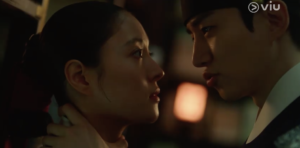
Deok-im’s courage comes at a cost however, and one of the most shocking moments comes when San puts her in a chokehold after her daring declaration of autonomy. At that moment, he literally has control over whether she would live or die, and it is a terrifying albeit realistic portrayal of how the real-life San would be like. As a crown prince, he grew up in the lap of luxury and held a lot of authority over those in the palace, particularly court ladies who were his servants. San probably had never faced the resistance that Deok-im was now displaying towards him, and his instinctive reaction was to assert dominance over her, even if it hurt her. I applaud The Red Sleeve for daring to portray San in this manner, even if it goes against the behaviour of a typical romantic male lead that modern viewers are used to seeing. This scene is definitely controversial among viewers, but it is an effective way to remind us of the historical setting of this piece, and the state of woman’s rights back then. Junho accomplishes this well too, pulling off a cold and steely demeanour despite his puppy-like eyes.
Since a large part of The Red Sleeve follows Deok-im’s journey and growth as a court lady, the drama delves a lot more into the everyday lives of court ladies than viewers are typically privy to. From the court ladies’ festival to the silkworm festival and to the coming of age ceremony, the drama’s portrayal of these events gives viewers a glimpse of how life as a court lady would have been like back then. Given Deok-im’s passion for storytelling (aka her lucrative side hustle) The Red Sleeve is also able to incorporate many folk tales and literature of the time. Her talent is even weaved nicely into the drama’s most climactic moments, demonstrating how every plot point has a purpose in this story.
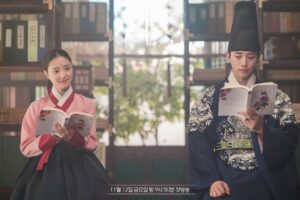
One of the greatest highlights of The Red Sleeve is the way it subverts common sageuk tropes, namely that of the childhood connection and the mistaken identity. While San and Deok-im do meet as children in the first episode of the story, they did not fall in love at first sight and proceed to pine over each other till adulthood. Rather, they offered companionship to each other, and solace in a time of grief. The mistaken identity trope also plays out in a surprisingly enjoyable way – Deok-im misunderstands San to be the Crown Prince’s tutor (who is actually played by the charming Kang Hoon) and San decides not to clarify the misunderstanding, enjoying the way they are able to banter and converse on an equal level. Unlike most dramas however, this misunderstanding did not drag on (it lasted for only two episodes!) and Deok-im quickly discovers San’s identity in a cleverly structured and well-shot scene. The breezy days did go by too quickly, but it was also great watching them confront their identities and navigate the complexities of the friendship/relationship they had formed. Both leads are doing a fantastic job, and whenever they share a scene, it’s instantly riveting.
The quick pacing of this drama makes sense since it has a lot to tell in just 16 episodes (compared to typical sageuks which have 40 or more episodes) but it is a testament to the strength of the writing that none of the characters feels any less fleshed out as a result. Plot points and character relationships are developed sufficiently even in this short amount of time, and if this isn’t effective storytelling, I don’t know what is.
The progress in San’s and Deok-im’s relationship for one, does not feel rushed. The amount of trust and loyalty they have with each other was built gradually with each challenge they overcame, and the increasing amount of affection they had towards each other was very believable. Them being serious bookworms and having books as their love language (whether in gifting books or in reciting poetic passages) is such a rarity in dramaland, and I’m so glad this couple is here for it.
All in all, wonderful performances from the entire cast, beautiful cinematography, lush visuals and an entrancing soundtrack make The Red Sleeve a must-watch among the many airing sageuks now. There’s still a long way to go, and things are likely to get a lot more dramatic from here on, but I have confidence that it will stay strong till the end.
(Images via MBC Drama. Youtube.)


